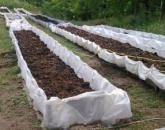The American private company Blue Origin has outlined its plans to create a heavy class space rocket. The American private company Blue Origin outlined its plans to create a heavy-class space rocket About Blue Origin and the settlement of the Sun
This is the second part of an article about companies that are ready to send you into space in the near future. Today we'll be looking at Blue Origin and their New Shepard system. We strongly recommend that you read the first part, which contains useful information O .
Brief description of Blue Origin technologies

Like the previous company (Virgin Galactic), Blue Origin provides a service suborbital space tourism. However, the technologies of all three differ markedly, for example, the New Shepard system from Blue Origin starts vertically, like a rocket (in general, this is a booster rocket) with a capsule on top that can hold people and equipment, while the Virgin begins its flight with acceleration along the runway like a normal aircraft. Having reached an altitude of +-100 km, the capsule separates, and the booster dives down, landing in the same way as it started.
Capsule with a volume of 15 cubic meters can accommodate 6 people. Through the meter windows that Blue Origin calls the largest windows in space, you can observe our beautiful planet from below and the boundless expanses of space from above, their exact size is 42.7 by 28.6 inches, which is 108 by 72 cm.

After separation, the capsule freezes, allowing the entire crew to enjoy weightlessness. Before the capsule begins to descend, an audible signal will alert you to return to your seats and fasten your seat belts.
During the descent you will experience the power congestion in 5G until the parachutes open and the lower engines slow down to smooth and soft landing on the ground, within a radius of several kilometers from the launch site where your rocket managed to land successfully. Video of the entire process below.
The price for the flight and the exact dates are not yet known, but book a flight possible today
Capsule for the crew of the reusable ship New Shepard
The headquarters of the aerospace company Blue Origin is tucked away in the middle of an industrial park in Kent, Washington. The company operates in secret. There are no signs or markings in front of the office.
On March 8, Blue Origin founder Jeff Bezos, the billionaire owner of Amazon, opened the doors of Blue Origin to reporters for the first time in history.
"Welcome to Blue," he said. - Thank you for coming". The entrepreneur rarely speaks to the press, but now he spent four hours with reporters, answering many questions.
Blue Origin is one of the private companies that represents the transition of the space business from NASA and aerospace giants like Lockheed Martin to small private firms. One of the most notable and successful among them is Space Exploration Technologies or SpaceX, founded by Internet entrepreneur Elon Musk. Last week, she launched another satellite into orbit, although an attempt to land a rocket on an offshore platform again ended in an explosion.
Much more quietly, Blue Origin also has big plans for space exploration, but so far hasn't shown outsiders exactly what it's doing. Now everything has changed. Jeff Bezos personally gave a large tour of the enterprise. His verbose speech was sometimes interrupted by loud laughter: “I am very pleased. I hope you can feel how much I like it,” he said.
Bezos showed a painting on the wall in the center of the facility, in which two turtles hold an hourglass and look up at a stylized depiction of the planets and space. Below is the Blue Origin motto: "Gradatim ferociter", from the Latin "Step by step, furiously" - without cutting corners, but without waiting too long. "You can go through all the steps quickly, but you can't skip a single step," Bezos explained.
He also spoke about breaking news in the direction of space tourism, which Blue Origin is working on. The launch of the reusable spacecraft and the New Shepard rocket took place in November 2015, and the successful return with a soft landing to Earth took place in January 2016. A restart is planned soon. Depending on the results of the test flights, the ship could carry the first paid space tourists into space, six people at a time, as early as 2018, Bezos said. Tourists will experience several minutes of flight in the absence of gravity.
Occasionally, Bezos interrupted his speech so that the company's engineers could demonstrate the new BE-4 engine that is in development, and the working version will begin testing at the end of the year.

Blue Origin engineers study the main combustion chamber of the BE-4 engine
Jeff Bezos founded Blue Origin in 2000, although few knew about it at the time. Over the next few years, half a dozen experts tried to find a better way to put payloads into orbit than rockets with loud, inefficient chemical-fueled engines. Came to the conclusion: better way No.
Bezos says he has been into rockets since the age of five. “I never thought that I would have the resources to start a space company. Amazon.com turned out to be a winning lottery ticket.”
The businessman refused to say how much money he invested in the realization of his dream: "Let's just say: a lot," he replied.
Around 2005, Bezos's company got serious about developing the rocket. Still almost no one knew what she was doing. For many years, the activities of Blue Origin remained shrouded in a veil of secrecy.
Sometimes the news leaked into external world: NASA award, Bezos blog post, successful launch video. Last year, the company made a brief public announcement at Cape Canaveral that Blue Origin rockets would launch from there.
Like Elon Musk, Jeff Bezos too speaks of his company not so much as a potentially profitable enterprise, but as part of a glorious future for humanity, where millions of people will live and work off Earth. He argues that humanity is obligated to follow this path in order to preserve the prosperity of its race.
His argument is simple. Energy consumption is growing by 2-3% every year. Even with moderate growth, in a few centuries energy consumption will reach a level that would be given out by solar panels if they cover the entire surface of the planet. "We will use all solar energy that reaches the Earth, he said. "That's the actual limit."
But there is a lot of energy and raw materials in other regions of the solar system, and eventually, he predicts, we are waiting for the "great inversion", that is, the reverse process. Instead of making complex components on Earth and launching them into space, heavy industry will migrate off the planet, and the Earth, he jokes, will become a residential area and a light industry area, which will return it to a more natural state: “There will be universities, at home and so on.
But this is still a distant future. The current business plan consists of several points. First, it is space tourism, with short-term flights of tourists from their own spaceport in West Texas in a capsule on a single-stage reusable New Sheppard rocket. Here, Richard Branson's Virgin Galactic startup competes. Space tourism is seen not as a pastime for the wealthy, but as a necessary step towards accumulating user experience. new technology, Bezos said, how the first airplanes or how video games spurred the development of more powerful computer chips.
Now most aerospace companies carry out about a dozen launches a year. “You will never achieve perfection if you launch 10, 12 rockets a year,” says Bezos. With short-term flights and reusable New Sheppard rockets, he plans to carry out several dozen launches annually.
The second part of the business plan is to sell rocket engines to other companies, such as United Launch Alliance, which plans to use them in the new generation of Vulcan rockets (future replacement for Atlas-5 and Delta-4). The engine will also find use in Blue Origin's own heavy rocket, which will launch payloads into orbit.
Jeff Bezos says that Blue Origin practically did not conduct public activities, not because of secrecy, but in order not to make unnecessary promises and not provoke hype, because in the space industry this is especially easy to do.
This is not the last tour organized by Blue Origin. Later this year, the company promises to provide more information about a new heavy rocket that will be launched from Cape Canaveral. They will also show the launch of New Sheppard from the spaceport in Texas.
Bezos promised that Blue Origin will become more open in the future.
Jeff Bezos jokingly allowed the appearance of Amazon on the moon Founder of Amazon and space company Blue Origin Jeff Bezos explained that space exploration is necessary in order to ... Earth. Head and founder of Amazon and owner of an aerospace company Blue Origin Jeff Bezos considered good question about whether there will ever be ... ironies, the TV channel notes. The presenter asked about why his Blue Origin focused on lunar exploration. "The reason we're flying to... Bezos' Blue Origin successfully tested its suborbital rocket ... launches. They, according to Forbes, may begin in the near future. Company Blue Origin Jeff Bezos has successfully completed another test launch of its reusable rocket... the director of astronomical and orbital sales said in a live broadcast of the launch Blue Origin Arian Cornell, clarifies the magazine. New Shepard, explains The Verge, is a rocket... Blue Origin successfully launched its suborbital rocket American company Blue Origin conducted the eighth test of their new version of the New Shepard system for ... tests that show how the capsule and rocket land. First Blue Origin has tested its new version of the system for suborbital flight in ... it is equipped with a wide window and improved thermal protection. In 2018 Blue Origin wants to launch a capsule with a person inside using his system. Blue Origin Bezos conducted tests spaceship New Shepard ... and a reusable rocket. Owned by Amazon founder Jeff Bezos American company Blue Origin conducted the first tests of a new version of the New Shepard system, including in ... the company did not officially report on the tests. The next day at Blue Origin considered them successful. From the previous version, designed for suborbital tourism... Blue Origin Blue Origin Competitor of RD-180 rocket engine bought from Russia tested in USA ...could be the most powerful American rocket engine for decades to come. Blue Origin plans to use the propulsion system on its new New heavy rocket ... on Big Falcon heavy rockets. BE-4 is reusable. Blue Origin previously focused on the development of small reusable suborbital rockets New ... ... work Blue Origin Blue Origin on... main project Blue Origin Blue Origin promised... The head of Amazon estimated the construction of its own launch vehicle at $ 2.5 billion ... work Blue Origin Bezos intends through the sale of Amazon shares for the corresponding amount. The entrepreneur stated that his ultimate goal is to bring Blue Origin on... main project Blue Origin is the suborbital spacecraft New Shepard, which is capable of short-term flights beyond the atmosphere. In 2017 Blue Origin promised...Business, 08 Mar 2017, 11:25
... ://twitter.com/JeffBezos/status/839112645957541890 According to Bezos, the first customer Blue Origin became the French satellite operator Eutelsat. “A few months ago we started ... until 2020. twitter: https://twitter.com/JeffBezos/status/838748139964272640 Blue OriginBusiness, 08 Mar 2017, 11:25
Blue Origin wins first satellite launch deal ... Bezos said on his Twitter. According to Bezos, the first customer Blue Origin became the French satellite operator Eutelsat. “A few months ago we started ... interested from the very beginning,” Bezos said (quoted by Bloomberg). Founder Blue Origin also tweeted pictures of the first finished engine for New ... BE-4 engines. The first launch is scheduled for 2020. Blue Origin announced the development space launch vehicle heavy class New Glenn... Blue Origin Blue Origin Blue Origin Blue Origin tested spacecraft evacuation system Private aerospace company Blue Origin successfully tested an evacuation system from her suborbital spacecraft... her launch pad in west Texas. A capsule in which the future Blue Origin plans to deliver tourists into space, urgently separated from a single-stage rocket ... New Shepard with the participation of test pilots. If they are successful, Blue Origin intends to start sending passengers into space as early as 2018...Business, 09 Mar 2016, 10:56
Blue Origin Blue Origin Blue Origin Blue OriginBusiness, 09 Mar 2016, 10:56
Jeff Bezos's company announced the date of the first sending of space tourists ... . If they are successful, Blue Origin intends to start sending passengers into space in 2018. Private space company Blue Origin plans to start sending tourists... which counts on the exit Blue Origin into profit. "I'm optimistic it will healthy business", - he said. Blue Origin intends to build six ships New ... In the United States for the first time were able to re-land a reusable rocket Company Blue Origin was able to re-perform a vertical landing of the New Shepard rocket. Restart... company Blue Origin last Friday, January 22, carried out a repeated successful vertical landing of the first stage of the New Shepard reusable rocket. About it Blue Origin reported ... 100.5 km and after the separation of the capsule returned to Earth. Blue Origin also announced plans to begin full-fledged tests in 2016 ... Company Blue Origin Blue Origin Blue Origin Amazon founder's company tested a ship for space tourists Company Blue Origin Jeff Bezos announced the successful launch of an experimental spacecraft for commercial flights. NASA has already congratulated its partner on its success. Blue Origin... . The head of the company promised new tests in the near future. Former leadership Blue Origin stated that the company will conduct dozens of tests of the New Shepard before the manned ...In early September 2016, Jeff Bezos, the founder of the Amazon Internet company, made a statement about the start of work on a heavy class space rocket. The rocket was named New Glenn. Bezos's Blue Origin company will be developing it, and the new launch vehicle should surpass all modern rockets in size. It is worth noting that Jeff Bezos, founder and head of the Internet company Amazon, is on the list the richest people planets, compiled Forbes magazine, ranks fourth. His fortune is estimated at 66.2 billion dollars, from which it can already be concluded that his ambitious project will be backed up at least financially.
Blue Origin is an American private aerospace company located 40 kilometers north of Van Horn, Culberson County, Texas. The company was founded in 2000 to develop a new direction - space tourism. Its founder was the owner and creator of Amazon.com, Jeffrey Bezos. The company is located on the territory of his ranch. Plans to create a new, more powerful reusable rocket called the New Glenn began to be talked about back in September last year. Its launches are planned to be carried out from the US Air Force Launch Complex No. 36, located at Cape Canaveral. As of September 2016, the aerospace company Blue Origin is building a launch pad and hangars at the Air Force Base.
The private American company Blue Origin designs and manufactures rockets for space tourism. To date, the company's engineers have only one successful project- suborbital rocket called New Shepard. This is a reusable rocket, it is designed to fly a little above the Karman line (the Karman line is the height above sea level, which is conventionally accepted as the boundary between the earth's atmosphere and space), that is, at an altitude of about 100 kilometers above sea level. The first successful landing of a New Shepard suborbital rocket occurred in November 2015. Later, the designers of Blue Origin conducted repeated tests of the rocket, including in emergency mode. The New Shepard rocket is a rather "modest" project: the crew capsule that forms its second module is designed to accommodate three people.
Launch of New Shepard in November 2015, photo: blueorigin.com
Although the modest tourist suborbital rocket New Shepard and the only successful space project implemented by Blue Origin, it was the first in the world to demonstrate the possibility of a controlled jet-powered landing at the take-off site, The Washington Post notes. In October 2016, the fifth and final test of the prototype of this suborbital rocket is scheduled for testing the rescue of its crew members. In January 2016, Blue Origin succeeded in making another successful vertical landing of the first stage of the New Shepard reusable rocket after it reached a height of 101.7 kilometers in flight. According to the founder of Blue Origin, launches of the New Shepard suborbital complex with the participation of test pilots are planned to begin in 2017. If these tests are successful, then in 2018 the company plans to move on to sending the first tourists into space, the businessman noted. Until recently, Jeff Bezos did not specify a start date for commercial flights using the New Shepard.
In September, The Washington Post, owned by D. Bezos, published comparative sketches of the new New Glenn rocket. From the published images, we can conclude that it is only slightly shorter than the Saturn V launch vehicle (the carrier of the American lunar program), and in terms of the diameter of the first stage (7 meters), it surpasses all rockets of our time. The purpose of the creation of the rocket is the manned space program and the delivery of goods into orbit, the test date for the new heavy rocket is "the end of the current decade." "Our the main objective“There are millions of people working and living in space, and the New Glenn rocket is an important step in that direction,” Bezos said.
The new heavy-duty launch vehicle called New Glenn, which Blue Origin engineers have been working on for perhaps 4 years, was named after John Glenn, the first American to orbit the Earth. The New Glenn rocket's first stage is 7 meters in diameter and is powered by 7 BE-4 engines that run on liquid oxygen and liquefied natural gas. The lift thrust of the rocket reaches 3.85 million pounds of thrust (a pound of thrust is the amount of thrust required to keep a 1-pound object (0.454 kg) stationary relative to Earth's gravity).

The New Glenn rocket will be presented in two configurations - with two and three stages, respectively. The height of the rocket in a two-stage version will be 82.2 meters. Its main purpose is the delivery of various cargoes to near-Earth orbits. The height of the three-stage version of the rocket is 95.4 meters, which is only slightly inferior to the Saturn-5 launch vehicle, which was used to carry out the first human landing on the lunar surface. The three-stage variant of the New Glenn rocket is intended for "important missions outside of Earth orbit." The second stage of the New Glenn launch vehicle will have an additional BE-4 engine installed. And the third stage of the rocket will be equipped with a BE-3 engine that runs on liquid oxygen and liquid hydrogen, it is noted that hydrogen will give the rocket a high specific impulse, which is important for using it outside the earth's orbit.
In the first stage of the rocket, as noted above, there should be 7 BE-4 engines of Blue Origin's own design on cryogenic components (methane - oxygen). The aerospace company calls them the best alternative to the Soviet RD-180 rocket engines (the American Atlas V heavy rocket is currently equipped with them). The BE-4 engines have not yet passed a series of flight tests, but Blue Origin engineers believe that with the data rocket engines their New Glenn will immediately surpass the Atlas V rocket by 10 times in terms of first-stage thrust near the ground (about 1700 tf). This is only two times less than the Saturn V rocket, which delivered American astronauts to the moon.
Currently, the main competitor of Blue Origin in the field of creating reusable rockets is considered to be another private American company SpaceX, owned by Elon Musk. Recently, its Falcon 9 rocket, carrying the Israeli AMOS-6 communications satellite, exploded during tests at the SLC-40 launch pad at Cape Canaveral. On the official twitter SpaceX it was said that the explosion of the rocket was due to an "anomaly" during a standard test burn. There were no casualties during the Falcon 9 explosion, but the rocket and cargo were completely destroyed as a result of the explosion.
Falcon 9 launch vehicle
American billionaire Elon Musk founded SpaceX in 2002. SpaceX engineers are building Falcon rockets. They have previously successfully designed and launched the Falcon 1 light-class launch vehicle and the medium-class Falcon 9 launch vehicle into space. The latter already has a successful flight to the ISS, and several times SpaceX managed to land the first stage of this rocket on the ground, as well as on an offshore platform. Currently, SpaceX engineers are working on the creation of a heavy-class launch vehicle that will be able to launch cargoes weighing up to 54.4 tons into low Earth orbit or deliver various cargoes weighing 13.6 tons to Mars.
Information sources:
https://nplus1.ru/news/2016/09/13/amazon-new-glenn
http://www.rbc.ru/technology_and_media/12/09/2016/57d6e9ec9a7947f10b2e5661
https://ria.ru/science/20160912/1476738294.html
http://bmpd.livejournal.com/2124516.html
Materials from open sources
Popular
- Additional earnings in your spare time (sitting at home on the Internet) for schoolchildren and people without work experience What is additional income
- Purchase of musical instruments
- Donald Trump Meets Pope Francis for the First Time
- This is some kind of non-marketing business When marketing is powerless
- Donald Trump, Bill Zunker Think big and don't slow down!
- How to start a construction business from scratch: a plan, step-by-step instructions and recommendations How to create a construction business from scratch
- What do rating agencies do How do rating agencies earn
- How to make your project attractive to investors
- What is a deal tape. Tape setup in QUIK. Exchange tape Spread, liquidity and trading activity
- Building a mining farm




